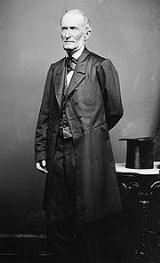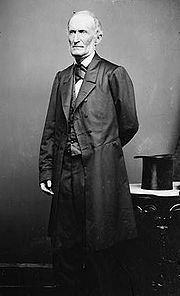
Isaac N. Arnold
Encyclopedia
Isaac Newton Arnold was an American politician
and biographer. He served two terms in the United States House of Representatives
and was known for his support of the abolition
of slavery.
 Arnold attended the Hartwick Seminary
Arnold attended the Hartwick Seminary
in his hometown of Hartwick, New York. He studied law
and was admitted to the bar
in 1835. He moved to Chicago in 1836 and began a successful law practice, during which time he made the acquaintance of fellow Illinois lawyer Abraham Lincoln
.
In 1842, Arnold was elected to the Illinois House of Representatives
as a Democrat
. He served three terms, and then left the Democrats to become an organizer of the Free Soil Party
in Illinois. Arnold served one more term in the state house from 1855-56 under the Free Soil banner, and then won election to the U.S. House as a Republican
in 1860. He was reelected in 1862. He was a strong supporter of President Lincoln during his tenure in Congress.
In March 1862, Arnold introduced a bill to abolish slavery in U.S. territories, which became law in June 1862. In February 1864, he introduced a constitutional amendment to abolish slavery throughout the United States. Although the bill did not pass in the 1864 session, it was renewed in 1865 and adopted as the Thirteenth Amendment to the United States Constitution
.
Arnold, facing a strong challenge in 1864 from Democrat John L. Scripps, withdrew from the race in favor of John Wentworth
, and accepted a presidential appointment as an auditor in the Treasury Department
. He left that post and returned to his law practice in 1866. At the same time, he began work on a biography of Lincoln. Arnold published The History of Abraham Lincoln in 1866, followed by the highly-regarded The Life of Abraham Lincoln in 1884. He also wrote The Life of Benedict Arnold
(1880).
Politics of the United States
The United States is a federal constitutional republic, in which the President of the United States , Congress, and judiciary share powers reserved to the national government, and the federal government shares sovereignty with the state governments.The executive branch is headed by the President...
and biographer. He served two terms in the United States House of Representatives
United States House of Representatives
The United States House of Representatives is one of the two Houses of the United States Congress, the bicameral legislature which also includes the Senate.The composition and powers of the House are established in Article One of the Constitution...
and was known for his support of the abolition
Abolitionism
Abolitionism is a movement to end slavery.In western Europe and the Americas abolitionism was a movement to end the slave trade and set slaves free. At the behest of Dominican priest Bartolomé de las Casas who was shocked at the treatment of natives in the New World, Spain enacted the first...
of slavery.

Hartwick College
Hartwick College is a non-denominational, private, four-year liberal arts and sciences college located in Oneonta, New York, in the United States. The institution was founded as Hartwick Seminary in 1797 through the will of John Christopher Hartwick, and is now known as Hartwick College...
in his hometown of Hartwick, New York. He studied law
Law
Law is a system of rules and guidelines which are enforced through social institutions to govern behavior, wherever possible. It shapes politics, economics and society in numerous ways and serves as a social mediator of relations between people. Contract law regulates everything from buying a bus...
and was admitted to the bar
Admission to the bar in the United States
In the United States, admission to the bar is the granting of permission by a particular court system to a lawyer to practice law in that system. Each U.S. state and similar jurisdiction has its own court system and sets its own rules for bar admission , which can lead to different admission...
in 1835. He moved to Chicago in 1836 and began a successful law practice, during which time he made the acquaintance of fellow Illinois lawyer Abraham Lincoln
Abraham Lincoln
Abraham Lincoln was the 16th President of the United States, serving from March 1861 until his assassination in April 1865. He successfully led his country through a great constitutional, military and moral crisis – the American Civil War – preserving the Union, while ending slavery, and...
.
In 1842, Arnold was elected to the Illinois House of Representatives
Illinois House of Representatives
The Illinois House of Representatives is the lower house of the Illinois General Assembly, the state legislature of the U.S. state of Illinois. The body was created by the first Illinois Constitution adopted in 1818. The state House of Representatives is made of 118 representatives elected from...
as a Democrat
Democratic Party (United States)
The Democratic Party is one of two major contemporary political parties in the United States, along with the Republican Party. The party's socially liberal and progressive platform is largely considered center-left in the U.S. political spectrum. The party has the lengthiest record of continuous...
. He served three terms, and then left the Democrats to become an organizer of the Free Soil Party
Free Soil Party
The Free Soil Party was a short-lived political party in the United States active in the 1848 and 1852 presidential elections, and in some state elections. It was a third party and a single-issue party that largely appealed to and drew its greatest strength from New York State. The party leadership...
in Illinois. Arnold served one more term in the state house from 1855-56 under the Free Soil banner, and then won election to the U.S. House as a Republican
Republican Party (United States)
The Republican Party is one of the two major contemporary political parties in the United States, along with the Democratic Party. Founded by anti-slavery expansion activists in 1854, it is often called the GOP . The party's platform generally reflects American conservatism in the U.S...
in 1860. He was reelected in 1862. He was a strong supporter of President Lincoln during his tenure in Congress.
In March 1862, Arnold introduced a bill to abolish slavery in U.S. territories, which became law in June 1862. In February 1864, he introduced a constitutional amendment to abolish slavery throughout the United States. Although the bill did not pass in the 1864 session, it was renewed in 1865 and adopted as the Thirteenth Amendment to the United States Constitution
Thirteenth Amendment to the United States Constitution
The Thirteenth Amendment to the United States Constitution officially abolished and continues to prohibit slavery and involuntary servitude, except as punishment for a crime. It was passed by the Senate on April 8, 1864, passed by the House on January 31, 1865, and adopted on December 6, 1865. On...
.
Arnold, facing a strong challenge in 1864 from Democrat John L. Scripps, withdrew from the race in favor of John Wentworth
John Wentworth (mayor)
"Long" John Wentworth was the editor of the Chicago Democrat, a two-term mayor of Chicago, and a six-term member of the United States House of Representatives....
, and accepted a presidential appointment as an auditor in the Treasury Department
United States Department of the Treasury
The Department of the Treasury is an executive department and the treasury of the United States federal government. It was established by an Act of Congress in 1789 to manage government revenue...
. He left that post and returned to his law practice in 1866. At the same time, he began work on a biography of Lincoln. Arnold published The History of Abraham Lincoln in 1866, followed by the highly-regarded The Life of Abraham Lincoln in 1884. He also wrote The Life of Benedict Arnold
Benedict Arnold
Benedict Arnold V was a general during the American Revolutionary War. He began the war in the Continental Army but later defected to the British Army. While a general on the American side, he obtained command of the fort at West Point, New York, and plotted to surrender it to the British forces...
(1880).

